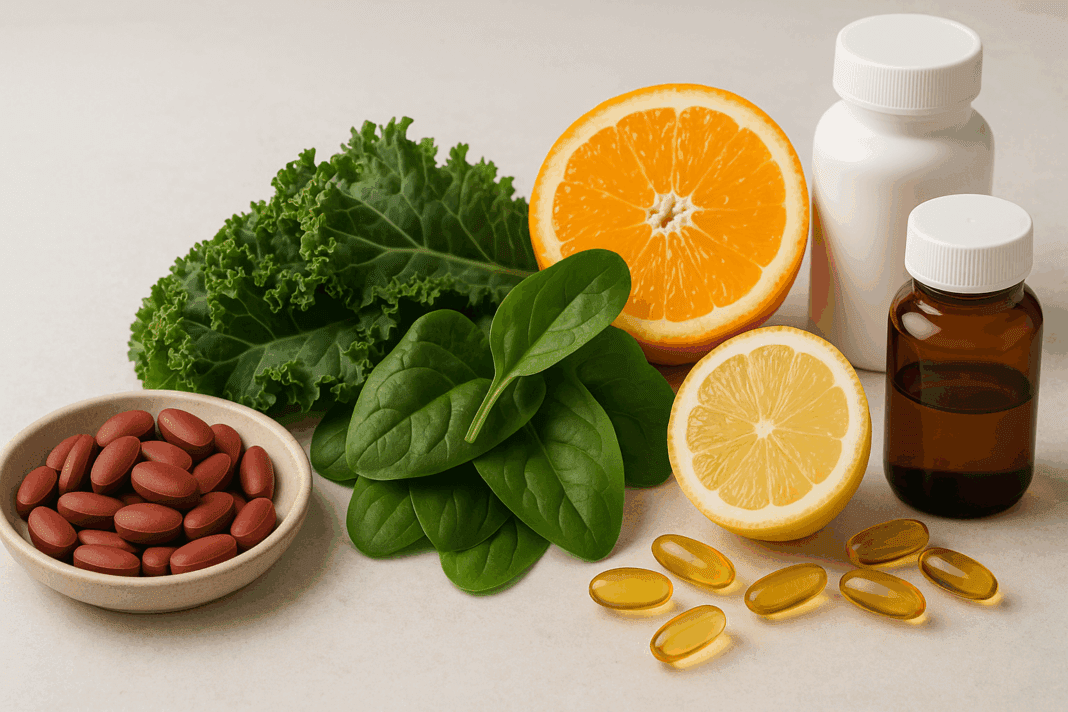Understanding Anemia: A Widespread Nutritional Challenge
Anemia remains one of the most common nutritional deficiencies globally, impacting individuals across all age groups and demographics. At its core, anemia reflects a condition in which the blood lacks adequate healthy red blood cells or hemoglobin, leading to fatigue, reduced immunity, weakness, and impaired cognitive function. Among the many causes of anemia, iron and vitamin deficiency rank at the top. These deficiencies often go unnoticed until symptoms become pronounced, making early detection and prevention strategies essential.
You may also like: Macronutrients vs Micronutrients: What the Simple Definition of Macronutrients Reveals About Your Diet and Health
While iron deficiency is widely recognized as a leading contributor to anemia, many overlook the critical roles that other vitamins play in red blood cell formation, oxygen transport, and overall blood health. From vitamin B12 and folate to vitamin C and B6, these nutrients work synergistically to maintain a healthy hematologic system. Choosing the best vitamins for anemia, therefore, requires a comprehensive understanding of both individual nutrient function and how they interact to prevent deficiency states. This approach is essential for those seeking an effective food supplement for anemia that supports long-term wellness.
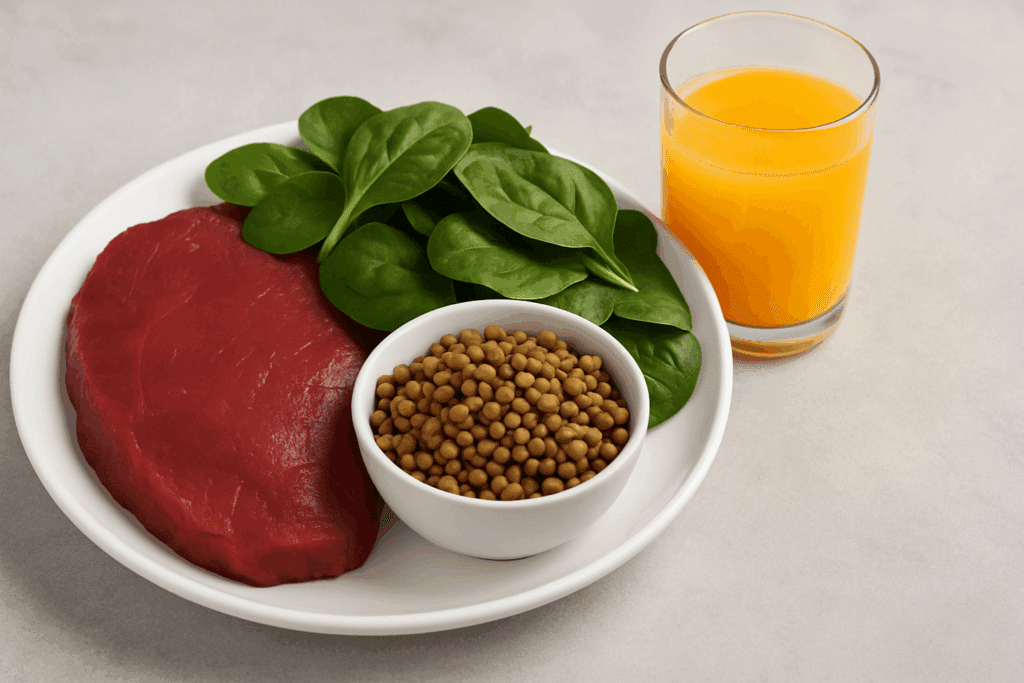
The Role of Iron in Preventing Anemia
Iron is perhaps the most crucial mineral when it comes to blood health. It serves as the central component of hemoglobin, the protein in red blood cells responsible for carrying oxygen throughout the body. When iron levels drop, the body struggles to produce enough functional hemoglobin, resulting in iron deficiency anemia. This condition is especially common in women of reproductive age, vegetarians, and individuals with chronic illnesses or gastrointestinal disorders.
Iron comes in two forms: heme and non-heme. Heme iron, found in animal products like red meat and poultry, is more readily absorbed. Non-heme iron, primarily present in plant-based foods like beans, lentils, and spinach, is less efficiently absorbed and requires additional nutrients—most notably vitamin C—for optimal bioavailability. For this reason, many experts recommend combining iron-rich foods with sources of vitamin C, such as citrus fruits or bell peppers, to enhance absorption naturally.
When dietary intake is insufficient, supplementation becomes necessary. Selecting a food supplement for anemia that contains iron in a gentle, bioavailable form—such as ferrous bisglycinate—can help mitigate common side effects like constipation or nausea. These formulations are generally better tolerated than traditional ferrous sulfate and improve adherence to therapy over the long term.
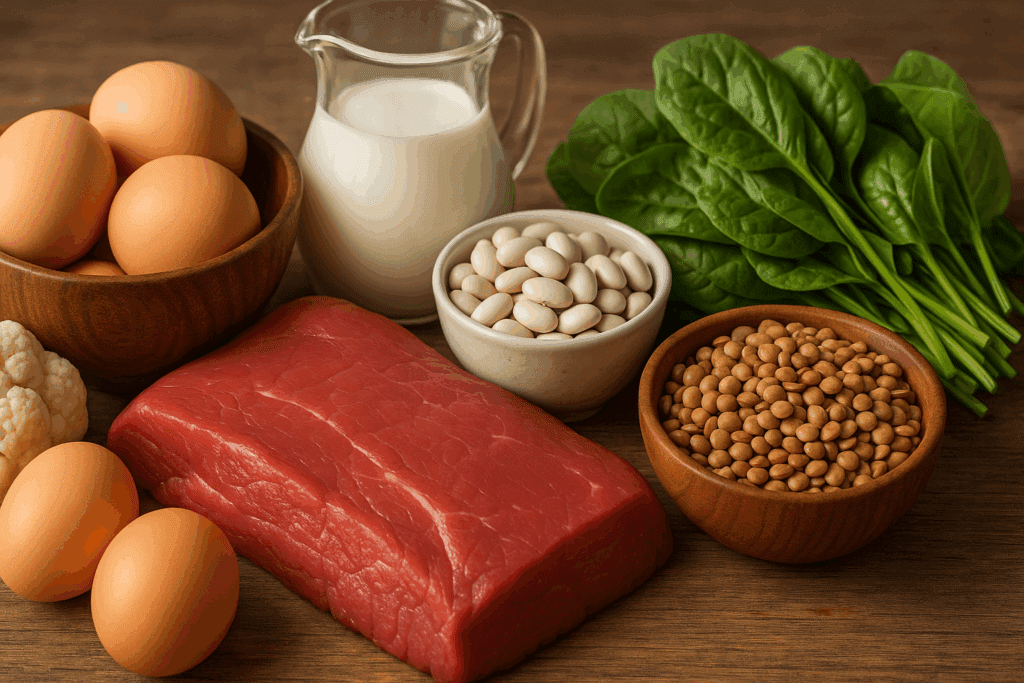
Vitamin B12 and Folate: Essential for Red Blood Cell Formation
While iron gets the most attention, vitamin B12 and folate are equally vital in preventing anemia, especially the megaloblastic subtype. This form of anemia is characterized by abnormally large red blood cells that function poorly, typically arising from deficiencies in either B12 or folate.
Vitamin B12 supports DNA synthesis, neurological health, and the maturation of red blood cells. Deficiency can lead not only to anemia but also to irreversible nerve damage if left unaddressed. This deficiency often arises not from poor dietary intake but from malabsorption conditions such as pernicious anemia, gastric surgery, or autoimmune disorders. For this reason, knowing what supplement prevents anemia must also involve ensuring proper B12 intake, especially for older adults, vegetarians, and those with gastrointestinal concerns.
Folate, also known as vitamin B9, plays a critical role in DNA and RNA synthesis, making it essential for cellular division and fetal development. Folate deficiency is particularly concerning during pregnancy, where inadequate levels increase the risk of neural tube defects in the developing fetus. Leafy greens, legumes, and fortified grains are good dietary sources, but supplementation with methylfolate—a bioactive form—may be necessary for individuals with genetic variants like MTHFR that impair folate metabolism.
An ideal supplement for anemia prevention includes both B12 and folate in forms that the body can absorb and utilize efficiently. These nutrients are indispensable when considering the best vitamins for anemia, especially for individuals at increased risk due to medical or genetic factors.
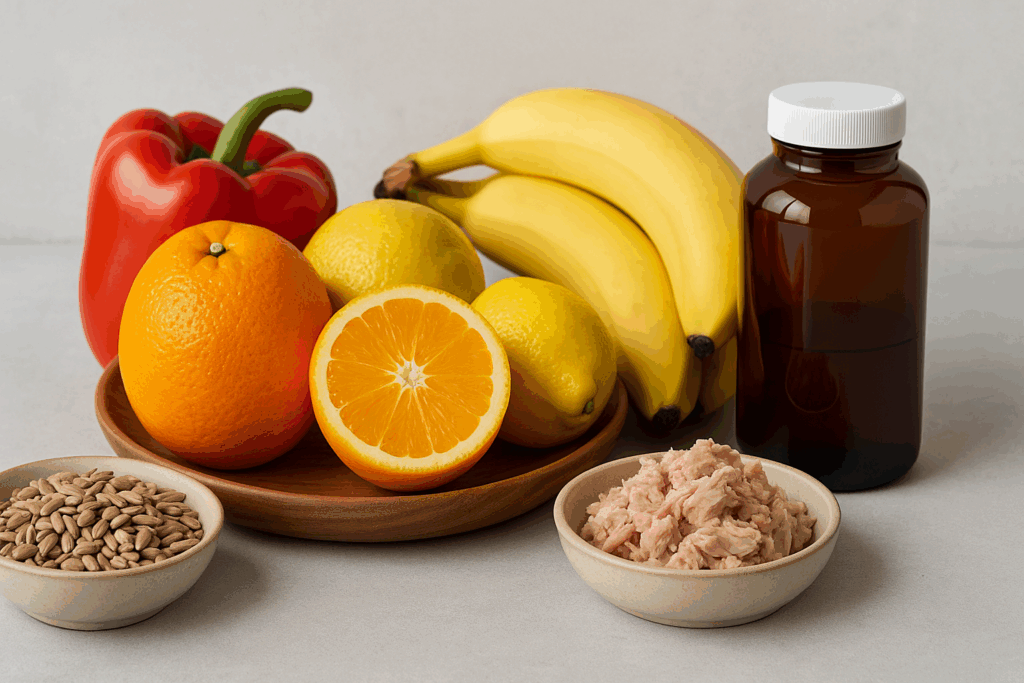
The Supportive Role of Vitamin C and Vitamin B6
Though not directly involved in the formation of hemoglobin, vitamin C plays a crucial auxiliary role by enhancing iron absorption. It converts iron into its ferrous form, which is more soluble and readily absorbed by the intestinal lining. This is especially important for people consuming non-heme iron from plant-based diets, where absorption rates are naturally lower.
Taking an iron-rich meal or supplement alongside a source of vitamin C, such as orange juice or a vitamin C capsule, can significantly improve iron uptake. For this reason, many multivitamins and iron supplements include vitamin C in their formulations. If you’re seeking a food supplement for anemia that works efficiently, make sure it includes this essential enhancer.
Vitamin B6, or pyridoxine, also contributes indirectly to anemia prevention. It aids in hemoglobin production and supports the synthesis of neurotransmitters and amino acids. While B6 deficiency is less common, it may occur in individuals with kidney disease, alcohol dependence, or those taking certain medications. A complete supplementation approach should include this often-overlooked vitamin as part of a broader strategy to combat iron and vitamin deficiency.
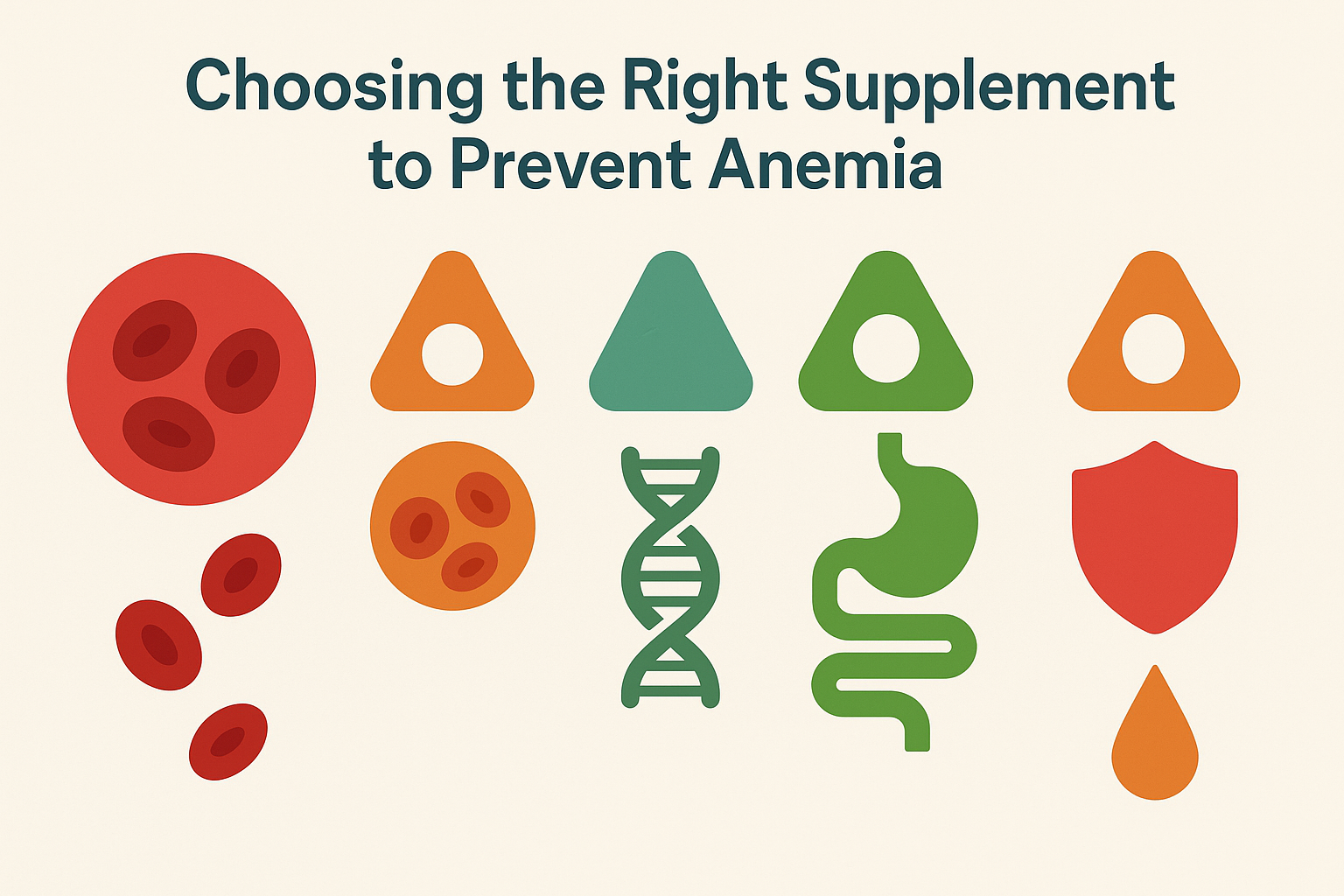
Choosing the Right Supplement to Prevent Anemia
Not all supplements are created equal, and understanding what supplement prevents anemia best depends on a person’s individual nutritional status, health history, and dietary patterns. For instance, women with heavy menstrual cycles, endurance athletes, and individuals recovering from surgery or chronic illness may require higher doses of iron and supporting nutrients. Conversely, healthy adults with adequate diets might only need a multivitamin to prevent deficiency.
In choosing the best vitamins for anemia, look for a supplement that includes iron, vitamin B12, folate, vitamin C, and B6 in appropriate forms and dosages. Methylated forms of B vitamins, such as methylcobalamin and methylfolate, offer enhanced bioavailability. For iron, chelated forms such as ferrous bisglycinate are typically easier on the stomach and more effectively absorbed than traditional ferrous sulfate.
It’s also important to understand the difference between maintenance and therapeutic doses. Supplements formulated for daily maintenance typically contain lower doses suitable for general health support, while those used to treat diagnosed anemia are more concentrated and may require medical supervision. Knowing the context of your health status will help you decide which type of food supplement for anemia is most appropriate.
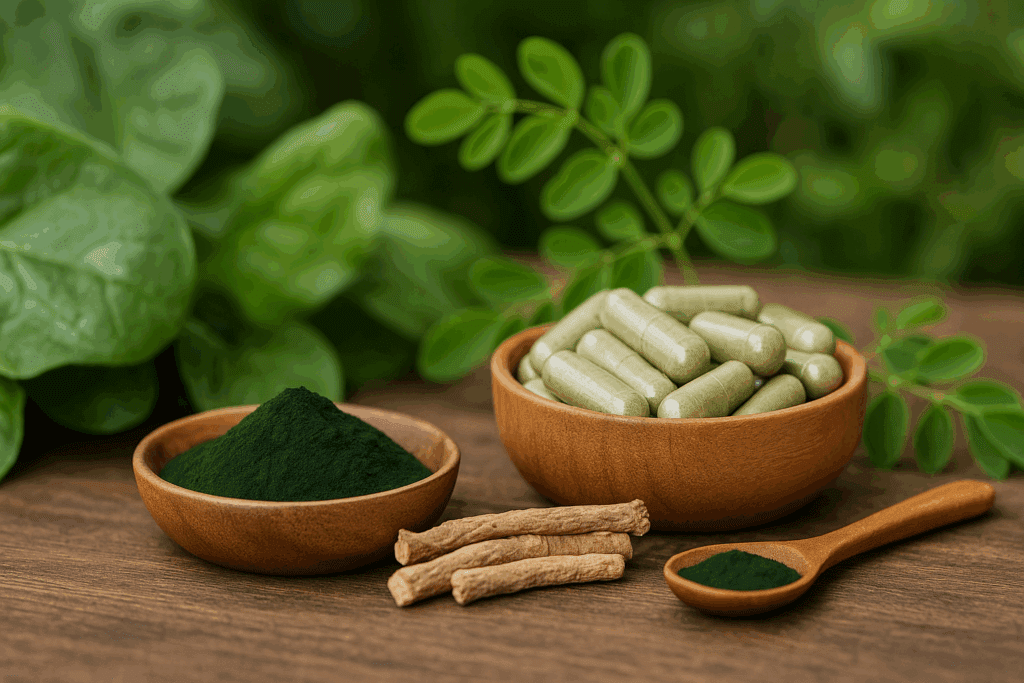
Whole Food-Based Supplements and Herbal Support
For those seeking a more holistic approach, whole food-based supplements provide additional nutritional cofactors that may enhance absorption and mimic the body’s natural nutrient environment. These supplements often include phytonutrients, plant enzymes, and trace minerals that support digestion and absorption. While the scientific data comparing whole food supplements to synthetic alternatives is still developing, many users report better tolerance and perceived benefits with whole food options.
Some functional foods and herbs—such as spirulina, moringa, and ashwagandha—are increasingly included in anemia-focused formulations. These botanicals are rich in iron and antioxidants and may help reduce inflammation or stress-related fatigue, further supporting hematologic health. Although not substitutes for clinically validated nutrients, they can complement a well-rounded supplementation plan. Still, individuals should consult a healthcare provider before combining herbal supplements with medications or existing treatment protocols.
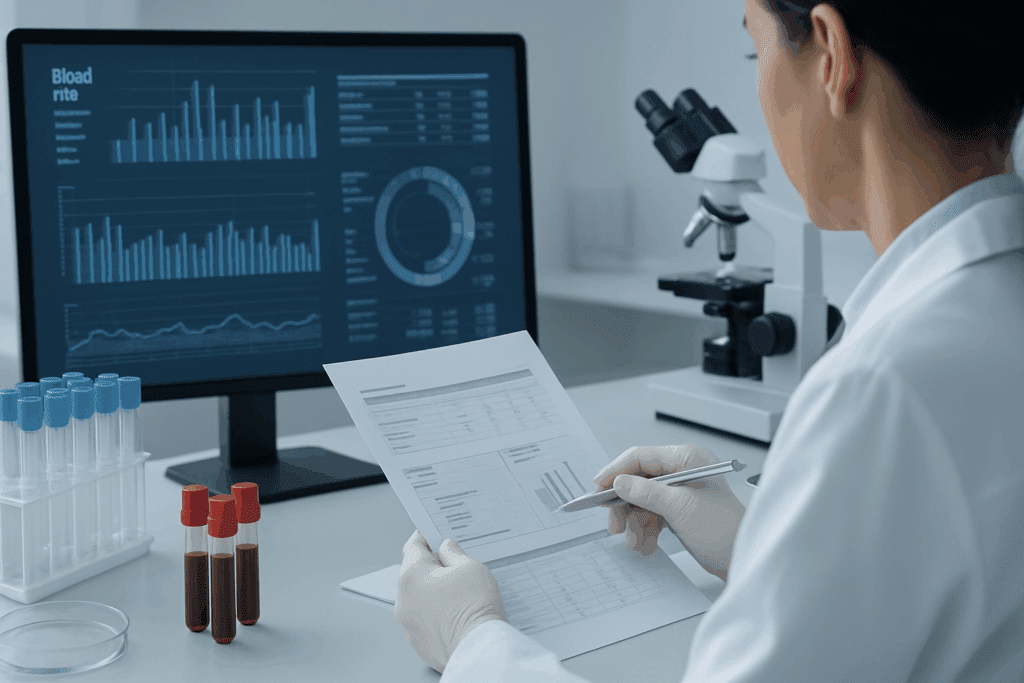
Laboratory Testing and the Importance of Personalized Nutrition
Before starting any supplement regimen, it is crucial to undergo proper laboratory testing. Blood tests such as a complete blood count (CBC), serum ferritin, transferrin saturation, and vitamin B12 and folate levels help determine the type and severity of anemia. This data enables more precise recommendations for supplementation, reducing the risk of ineffective or excessive treatment.
For example, someone with a vitamin B12 deficiency would not benefit from high-dose iron supplementation and might even experience adverse effects. Personalized nutrition strategies ensure that you’re addressing the root cause of your symptoms rather than masking them with generalized solutions. This level of customization is essential in choosing the best food supplement for anemia and ensuring long-term effectiveness.
Dietary Strategies That Complement Supplementation
While supplements play a crucial role, they should never fully replace a nutrient-dense diet. A well-rounded eating plan that includes iron-rich foods—such as lean red meat, chicken, fish, tofu, lentils, chickpeas, and fortified cereals—can prevent anemia naturally. For vegetarians and vegans, pairing these foods with vitamin C-rich produce helps maximize non-heme iron absorption.
It is also advisable to limit substances that inhibit iron absorption, such as calcium supplements, coffee, tea, and high-phytate grains, when consuming iron-rich meals. These compounds can interfere with iron uptake, making supplementation less effective. Strategic meal planning that considers these factors enhances the impact of both dietary and supplemental interventions in managing iron and vitamin deficiency.
Special Considerations for High-Risk Populations
Certain groups face a heightened risk for anemia and require special consideration. These include pregnant women, individuals with chronic kidney disease, elderly adults, and people with gastrointestinal disorders. Each of these populations may have unique needs that require targeted supplementation and ongoing monitoring.
For pregnant women, folate and iron are especially critical. Prenatal vitamins often contain higher levels of these nutrients to support both maternal and fetal health. Elderly individuals, on the other hand, may benefit from liquid or chewable supplements that are easier to digest and absorb. Consulting with a healthcare provider ensures that the chosen food supplement for anemia matches individual physiological demands and life stages.
Healthcare Provider Guidance and Public Health Perspectives
Healthcare providers—especially registered dietitians and integrative practitioners—play a vital role in assessing nutritional status, recommending appropriate supplements, and monitoring progress over time. They also help distinguish between temporary, reversible deficiencies and those requiring long-term management. Engaging with a professional can save time, reduce frustration, and ensure that treatment strategies align with evidence-based medical guidelines.
On a broader level, public health interventions like food fortification and nutrition education have proven successful in reducing anemia prevalence, particularly in underserved populations. Flour, rice, and cereal products enriched with iron and folic acid have helped lower rates of deficiency-related anemia in many parts of the world. Continued investment in accessible, affordable, and culturally relevant solutions will be key to further reducing the global burden of this preventable condition.
Frequently Asked Questions: Best Vitamins and Supplements for Anemia and Iron Deficiency
1. Can lifestyle habits affect the effectiveness of a food supplement for anemia? Yes, lifestyle habits significantly influence how well a food supplement for anemia works. Factors such as caffeine consumption, smoking, alcohol intake, and sleep patterns all affect nutrient absorption and metabolism. For example, drinking coffee or tea with meals can inhibit iron absorption due to tannins and polyphenols. Smoking may increase oxidative stress, depleting vitamin C, which is essential for iron uptake. A consistent sleep-wake cycle and regular physical activity can enhance overall nutrient utilization, making supplementation more effective in supporting blood health.
2. What role does gut health play in iron and vitamin deficiency? Gut health is a critical but often overlooked factor in addressing iron and vitamin deficiency. Conditions like irritable bowel syndrome (IBS), inflammatory bowel disease (IBD), and even low stomach acid can impair the absorption of key nutrients, including iron, vitamin B12, and folate. The presence of healthy gut microbiota also influences how well these vitamins are metabolized and absorbed. Even the best vitamins for anemia may be poorly utilized if gut inflammation or microbial imbalance exists. Supporting gut health with probiotics and anti-inflammatory foods can improve the body’s ability to respond to a food supplement for anemia.
3. Are there specific populations that require different approaches to what supplement prevents anemia? Absolutely. What supplement prevents anemia effectively varies based on age, sex, medical history, and dietary pattern. For example, premenopausal women often benefit from iron-rich supplements due to menstrual blood loss, while older adults may need vitamin B12 in sublingual or injectable forms because of decreased intrinsic factor. Vegans and vegetarians might struggle with both iron and vitamin deficiency due to a lack of heme iron and bioavailable B12. In these cases, personalized supplementation strategies are essential. Even among the best vitamins for anemia, formulations should be tailored to individual biochemical and lifestyle needs.
4. How do stress and mental health affect anemia and nutrient levels? Chronic stress has a surprisingly deep impact on nutrient status and anemia. Stress hormones like cortisol can reduce gastric acid secretion, which impairs the absorption of non-heme iron and B12. Prolonged psychological stress may also contribute to inflammation that disrupts gut barrier function, compounding iron and vitamin deficiency risks. Moreover, people under chronic stress often experience changes in eating patterns—skipping meals, choosing low-nutrient foods—which directly affect nutrient intake. Addressing stress through mindfulness, therapy, and lifestyle changes can enhance the effectiveness of a food supplement for anemia.
5. Can over-supplementation with iron or vitamins be harmful? Yes, more is not always better when it comes to supplementation. Excessive intake of iron can lead to toxicity, especially in individuals without a diagnosed deficiency, potentially damaging the liver and causing oxidative stress. Similarly, high doses of folic acid can mask a vitamin B12 deficiency, delaying treatment and increasing the risk of neurological damage. When selecting what supplement prevents anemia, it’s important to match the dosage to your lab results and physician recommendations. Choosing the best vitamins for anemia requires a balance that supports health without tipping into excess.
6. Are there innovations in supplement delivery systems that improve absorption? Recent advances in supplement technology have focused on increasing bioavailability through novel delivery systems. Liposomal encapsulation, for instance, protects nutrients like iron and vitamin C from stomach acid and enhances absorption in the intestines. Slow-release tablets and sublingual sprays offer alternative routes for individuals with malabsorption issues or gastrointestinal sensitivities. These cutting-edge approaches make it easier for the body to use the nutrients found in the best vitamins for anemia. For individuals with chronic iron and vitamin deficiency, these innovations offer promising options for improving treatment outcomes.
7. How do medications interact with food supplements for anemia? Many medications can interfere with the absorption or function of nutrients needed to prevent anemia. Proton pump inhibitors (PPIs), commonly used for acid reflux, reduce stomach acid and impair iron and B12 absorption. Certain antibiotics, anticonvulsants, and diabetes drugs may also affect folate and B12 levels. In such cases, selecting a food supplement for anemia that includes bioavailable forms and considering the timing of supplementation can mitigate negative interactions. Discussing potential drug-nutrient interactions with a healthcare provider is essential when choosing what supplement prevents anemia.
8. Is it possible to support blood health naturally without supplements? While supplements are effective, especially when deficiencies are present, some individuals can support blood health through diet and lifestyle alone. Iron-rich foods such as red meat, lentils, and fortified cereals combined with vitamin C-rich produce can provide substantial nutritional support. However, in populations at higher risk for deficiency—such as pregnant women, adolescents, and those with chronic illnesses—relying solely on diet may be insufficient. In such cases, the best vitamins for anemia fill essential gaps. Even with an optimal diet, environmental and biological factors may necessitate targeted use of a food supplement for anemia.
9. How long does it typically take to see improvements from anemia supplements? The timeline for improvement depends on the severity of the deficiency, the type of supplement used, and individual absorption capacity. Typically, individuals begin to notice improved energy and reduced symptoms within two to four weeks of starting a properly dosed supplement. However, complete restoration of iron stores or B12 levels may take several months. When evaluating what supplement prevents anemia most effectively, it’s important to consider not just immediate symptom relief but also long-term replenishment of nutrient reserves. Patience and consistency are key to reversing iron and vitamin deficiency sustainably.
10. What are signs that a supplement is not working or is poorly absorbed? If symptoms like fatigue, dizziness, or pallor persist after consistent supplement use, it may indicate poor absorption or an inappropriate formulation. Gastrointestinal side effects, such as nausea or constipation, may also lead to noncompliance and suboptimal outcomes. Blood work showing minimal improvement despite regular intake is another red flag. Switching to a different delivery form—such as a liposomal or whole food-based product—may improve results. Understanding how your body responds to a food supplement for anemia is essential in selecting the best vitamins for anemia that truly support your needs.
Supporting Long-Term Blood Health: Why the Right Supplement for Anemia Matters More Than Ever
In the journey toward vibrant health, preventing and treating anemia requires more than simply addressing symptoms—it demands a deeper understanding of nutrient synergy and individual health needs. The best vitamins for anemia are not standalone solutions but part of a broader approach that includes iron, vitamin B12, folate, vitamin C, and B6 working together to support red blood cell production and function. Whether you’re managing a diagnosed deficiency or looking to maintain optimal energy levels, selecting a well-formulated, evidence-based food supplement for anemia is a proactive investment in your well-being.
Knowing what supplement prevents anemia is about making informed, personalized choices that are guided by both science and your body’s unique requirements. Through thoughtful supplementation, nutrient-rich foods, and regular medical oversight, individuals can reclaim their energy, improve their blood health, and prevent the complications associated with iron and vitamin deficiency. In this context, nutritional support becomes not just a treatment, but a foundation for a stronger, more resilient future.
Further Reading:
Iron Supplement (Ferrous Sulfate)


